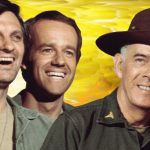Veteran actress Gena Rowlands enjoyed a mostly blissful decades-long marriage with her hubby John Cassavetes until his death. While the two remained as in love as ever throughout that union, as with any marriage, they experienced their fair share of challenges. To make a marriage work, you have to work at it continually. Marriage is about being willing to make compromises and letting go of one’s ego to forgive and forget when the going gets tough.
Aside from their famed and inspirational love story, Rowlands and Cassavetes were lucky enough to appear in numerous films together. There’s something to be said about a couple that is able to spend all of their free time at home together and still being able to collaborate in their professional lives. This scenario hasn’t always played out quite as well with other celebrity couples. Often when married couples end up working together, their romance fades, or they end up becoming immensely jealous of each other for one reason or another.
Now some of you, especially our younger viewers, might not be all that familiar with the two stars that we’ll be discussing in today’s video. To catch you up to speed, Gena Rowlands is a four-time Emmy and two-time Golden Globe recipient. She’s best known for collaborating with Cassavetes in ten films, including 1980s Gloria and 1974s A Woman Under The Influence.
Gena won the Silver Bear award for Best Actress for her stunning performance in 1977s Opening Night. Some of her other notable films include Woody Allen’s 1988 drama Another Woman and the 2004 romantic drama The Notebook, the latter of which was directed by her son, Nick Cassavetes.
John Cassavetes was a Greek-American actor and filmmaker who is noted for being a pioneer of American independent cinema. Many of the films that he wrote and directed were financed, at least in part, out of his own pocket. He’s been called an ‘iconoclastic maverick’ by the writers over at AllMovie, while the New Yorker in 2013 called him one of the most influential American directors of the last 50 years.
As far as his acting career goes, Cassavetes appeared in films like 1957s Edge of the City, 1967s The Dirty Dozen, and 1968s Rosemary’s Baby. As a director, he worked on films like 1959s independent feature Shadows as well as 1968s Faces, 1970s Husbands, 1977s Opening Night, and 1984s Love Streams.
Cassavetes’s decades of hard work and dedication in the entertainment industry earned him numerous awards and accolades, including an Academy Award nomination for Best Supporting Actor for his appearance in the Dirty Dozen. In 1968, he was nominated for the Academy Award for Best Original Screenplay for his film Faces. Less than a decade later, he was nominated once again for an Academy Award for Best Director for 1974s A Woman Under The Influence.
Clearly, Rowlands and Cassavetes were a true Hollywood power couple. It’s a challenge to even think about other Hollywood couples that accomplished half as much as they did together. It’s reasonable to assume that their deep-seated love for each other contributed significantly to the success of their professional collaborations. That being said, when they experienced marital troubles, they did everything in their power to keep them under wraps. Join Facts Verse as we discuss how Gena Rowlands and John Cassavetes hid their troubled marriage.
From College Romance To Hollywood
Gena Rowlands and John Cassavetes met at the American Academy at Carnegie Hall, where they both were enrolled as students. But before we touch on their marital life, let’s take a look back at both of their childhoods to see where they came from and how they came to realize that their futures were destined to be in cinema.
Rowlands was born in Cambria, Wisconsin, in 1930. Her mom, Mary Allen, was a housewife who eventually worked as an actress under the name Lady Rowlands. Gena’s father, Edwin Rowlands, worked as a banker and state legislator.
In 1939, Rowland’s family moved to Washington DC when her father was appointed to a position with the United States Department of Agriculture. He later held several other high-up governmental positions.
Gena was inspired by her mother’s love for theater to seek a career in show business herself. While she first attended the University of Wisconsin, she later left for the Big Apple to study drama at the prestigious American Academy of Dramatic Arts.
John Cassavetes was born in 1929 in New York City. His mother was actress Katherine Cassavetes, who would later be featured in some of John’s feature films. His father was Greek immigrant Nicholas John Cassavetes.
John was raised in Long Island, where he attended Port Washington High School. It was there, that he got his first taste for acting, appearing in numerous class plays, including a production of Red Domino. Eventually, he transferred to the Blair Academy in New Jersey, where he finished up his High School education.
After graduating from high school, John spent a semester at Plattsburgh, New York’s Champlain College before getting expelled due to poor grades. He then spent several weeks hitchhiking to Florida before enrolling at the American Academy of Dramatic Arts. He had heard from some of his friends that the school was ‘packed with girls’, but little did he know it was there that he would meet the love of his life, Gena Rowlands.
After John graduated in 1950, the two met in 1953 when Rowlands was auditioning to enter the academy. After dating for just four months, the couple got married in early 1954. Cassavetes continued to act in theater and eventually was offered a handful of minor roles in films. Around this time, he began working on TV in anthology series like Alcoa theater.
As time went on, Cassavetes landed more and more parts in TV shows and films. He eventually gained notoriety when he played a vicious killer in 1955s The Night Holds Terror. In 1959, he made his writing and directing debut with his film Shadows.
John Could Be Cruel
As a director, Cassavetes was known for being extremely demanding. He could be manipulative and at times downright cruel. But that was the nature of his craft. At the end of the day, all he wanted was to elicit truthful performances out of his actors.
For example, when filming his 1971 film Minnie and Moskowitz, he failed to tell his wife Gena in advance that he would be playing the part of her lover, Jim, until right before filming. When a scene required him to ‘hit’ her, she decided to get back at him for not cluing her in about the situation by letting the film crew think that Cassavetes had actually attacked her. They subsequently sprang to her aid, and it was a whole big thing. She even pretended to be hurt.
In his autobiographical memoir, Cassavetes on Cassavetes, the actor and filmmaker made note of just how dissimilar he and his wife actually were. According to him, their tastes hardly ever aligned, and whatever point he tried to make or belief he held, she always seemed to be on the complete opposite page. But then again, as problematic as this might sound, they do, after all, say that opposites attract, right?
Despite constantly butting heads and never being able to see things eye to eye, both John and Gena worked tirelessly at keeping their romance alive. They knew more than most that marriage is all about patience and give and take.
Cassavetes and Rowland’s disagreements likely stemmed from their differences in upbringing and temperaments. Gena had grown up in the country and came from a well-off family, while John was a fast-talking street-wise city slicker.
His wife was socially refined, while he was this rough and tumble, impulsive, and very passionate kind of guy. He could have a bit of temper, but that seemed to only make him better at his craft. He was the kind of person that knew what he wanted and would be damned if anyone got in the way of that vision.
While on set, this ‘half crazy’ side of his personality sometimes manifested in him displaying almost frat boy-like tendencies. For instance, on one occasion, he walked through set with a banana lodged between his butt cheeks. He probably thought that he was lightening the mood, but not everyone appreciated his juvenile attempt at humor.
Other times, in an attempt to elicit an authentic, unrehearsed emotional response in his co-stars, he would resort to being abusive. One actress who was at the receiving end of this behavior was Lynn Carlin, who Cassavetes slapped across the face right before filming a scene while yelling at her to not cry. Can you imagine if an actor were to attempt such a stunt today? They’d be canceled in an instant.
Cassavetes Met His Match With Rowlands
While Cassavete’s volatility in the workplace stirred up tensions and created uncomfortable levels of Friction, this side of him was also at the root of what seemed to be his deep, long-lasting bond with Gena.
Rowland’s was just as strong-willed as he was. When they got together, it was as if Cassavetes had finally met his match.
The strength of Rowland’s will is clearly displayed when you watch her on-screen performances, especially when Cassavetes was sitting in the director’s seat. She’s a fierce, expressive, and remarkably graceful woman who was more than capable of holding her own.
She also wasn’t afraid to step up to the plate and fend for herself when she needed to. On one occasion during the making of Shadows, Cassavetes’s first film, he and Rowland’s were badly in debt. Rowland’s also happened to be seven months pregnant with her son Nick at the time, and they owed the milkman over a grand.
The couple had set aside $300 for hospital bills, but John ended up taking that money and using it to help fund his film. When she found out what he had done, she told him that she would have to deliver the baby on her own and that it didn’t matter if he felt remorse for taking the money because he wouldn’t be there when it was time for her to deliver.
Later on, after the child was born, Cassavetes went out to California to begin shooting the television series Johnny Staccato. When Rowlands flew out west to visit him, it was as if he had totally forgotten that he was the father of a newborn. He was so immersed in his work, that he didn’t even take the time to ask how his son was doing.
Later on in their marriage, Cassavetes began sleeping around while engaging in bouts of binge drinking and gambling. At one point, he even said that a married man had the right to, quote, ‘get drunk, screw around and go to the whorehouse’.
Despite all of these issues, Rowlands stayed by her husband’s side. Their romance may not have been something out of a fairy tale, but in many ways, it was way more beautiful than that. Obviously, they had their fair share of problems, and Cassavetes had a tendency of making an ass out of himself when he was caught up in his work and his endless search for pleasure. At one point, they even toyed around with the idea of getting divorced, but ultimately they were able to let the past stay in the past and continue to move forward towards the future together. If that’s not a beautiful love story, then we don’t know what is.
With that, we’ll go ahead and wrap this video up, but before you go, we’d love to hear from you. Did you know that Gena Rowlands and John Cassavetes appeared in 10 films together, and that despite dealing with some serious turbulence in their marriage, they remained by each other’s side until Cassavetes’s death? Let us know in the comments.


